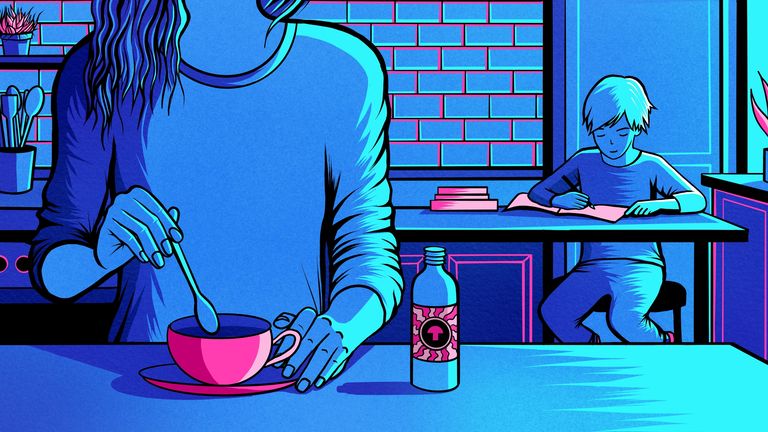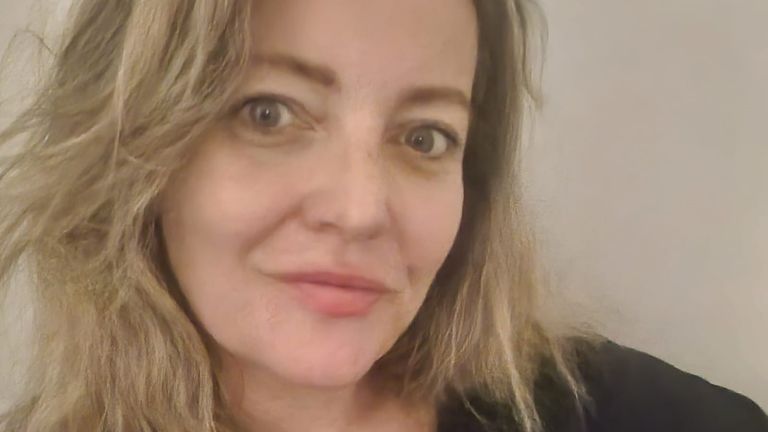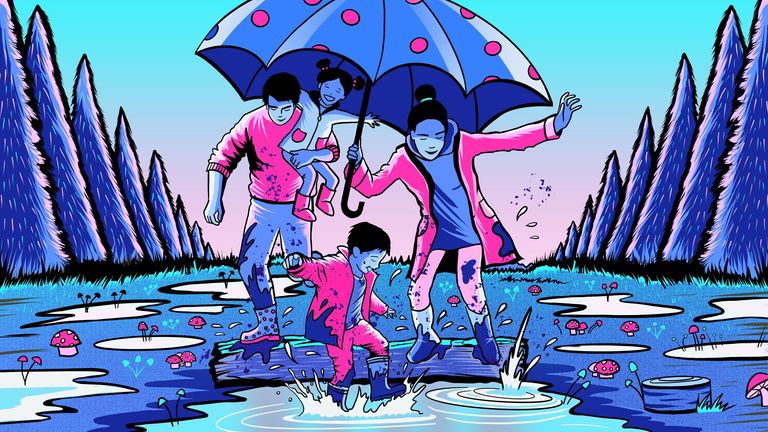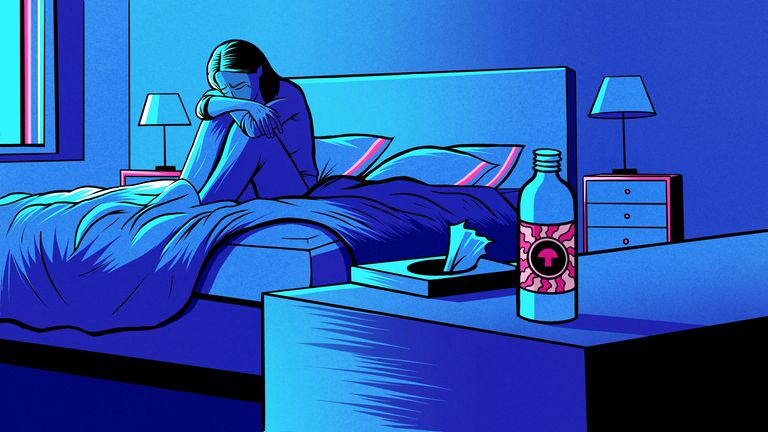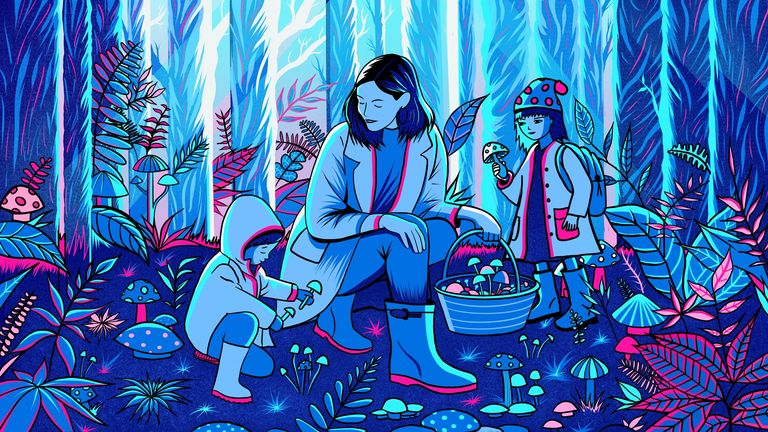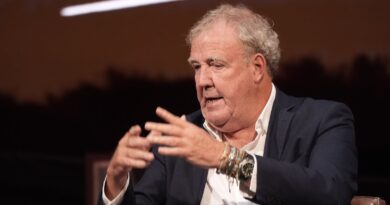Mums on magic mushrooms: Why parents are ‘microdosing’ Class A drug | UK News
When Ella* gets up in the morning, she often starts her day with a Class A drug before breakfast. A cup of tea and a small capsule of magic mushroom “dust”, before taking her three children to school and carrying on with her day.
The 36-year-old, who lives in Buckinghamshire, says she is not tripping as she waves them goodbye. Rather, she is one of a number of parents microdosing hallucinogens, which she believes eases the stresses of modern life.
“I’m a better parent,” Ella claims of her psychedelic use. She says she feels calmer, happier, less anxious, less likely to catastrophise when things don’t go to plan. “I’m more present, I interact with my children better. Rather than me trying to just keep it together as a mother, it’s now quality time.”
Psychedelics have been gaining mainstream attention in recent years. In the US, where psilocybin – the naturally occurring compound in magic mushrooms – has been legalised for medicinal use in some states, there are several online communities for parents which have sprung up online.
Illegal in the UK – although there are calls from some quarters for restrictions to be eased – a rise in interest here is in no small part down to microdosing, defined as taking tiny doses “below the perceptual threshold” that “do not impair normal functioning”.
The number of people aged 16 to 59 using the drug in England and Wales is estimated to have more than doubled in the past decade, from 119,000 in the year ending March 2014 to 279,000 in 2023, according to the latest Office for National Statistics research. Since 2020 alone there has been a rise of 68%, from around 166,000.
Health and legal risks
But there are potentially serious consequences should you be caught. As a Class A drug in the UK, the maximum penalty for possession is up to seven years in prison, an unlimited fine, or both. The maximum penalty for supply or production is life in prison.
Taking them in larger quantities can have serious effects. Frank, the anti-drug advisory service, warns magic mushrooms can make you feel “paranoid, anxious, overwhelmed” and can cause dizziness, sickness and stomach pains, while the NHS lists them among the drugs that can trigger psychotic episodes.
“I had visual disturbances for a few days afterwards one time,” one user told Sky News, talking about a larger dose of mushrooms rather than microdosing. “Fortunately, it went away. But it was horrible. I was sober, I knew what I was doing, but the effects were awful.”
And one microdoser shared how her initial experiences made her feel “less anxious” and happier, but after upping her dose she felt down and less in control of her emotions.
‘Being a mum is amazing – but it can be hard’
On microdosing, scientists say the illegal status of the drug has prevented serious research on the topic specifically and what the long-term negative effects may be, while separate placebo studies for microdosing both psilocybin and LSD have found that users’ expectations are behind at least some of the anecdotal benefits.
But many magic mushroom microdosers claim it has improved their lives.
Ella says she found herself drinking more and taking drugs recreationally following the end of a relationship. Life as a single parent was hard. “My kids were fed and clothed but I was emotionally disconnected. Most days I would get them off to school and go back to bed and cry.”
During the pandemic, she realised she needed to make a change. After meeting her current partner, they looked into microdosing mushrooms and started taking very small doses for what she says are calming effects, rather than full hallucinogenic trips. She now takes a small capsule on a few mornings each week, with a few days off.
She says the couple have done their research and claims “there’s no way I could accidentally take too much”. She is happy to keep her capsules at home and says she treats them as she would any substance that might potentially be harmful, making sure they’re “not lying around for the children to pick up”.
Ella, like most of the parents I spoke to for this article, did not want to give her real name. “Being a mum’s not bad – it’s amazing – but it can be hard… and psychedelics have helped me as a parent massively,” said one. “But I’m a single mum – and it is a drug. It’s frustrating as it’s something I’m passionate about, but I can’t risk [speaking publicly about it].”
‘I feel more in tune’
But Molly Gunn, a mother of three from Somerset (pictured above), is open about having microdosed, saying she first tried it about five years ago.
She says she has taken tiny doses, sometimes when her children were present, and chose to try it as an alternative to alcohol, using drops once or twice a week during periods of taking a break from drinking wine; she gives little away about how she has obtained them, simply saying: “I know someone who knows someone.”
While one experience left her in tears – “I just cried and cried… like I had loads of emotions to get out” – Molly says others have been happy. “I’ve had family dinners and laughed so much, tears streaming down my face, because my kids are so funny. I remember turning to my husband and I was like, ‘are they always this funny?'”
Some microdosers say the effects are similar to a small glass of wine, while Ella says they are more subtle. Others compare the feeling to the buzz from a strong cup of coffee. “I just felt quite relaxed and mellow, happy,” says Molly. “You feel more in tune with what’s going on around you. So when my kids are around, it made me more in tune with them.”
While she knows it is not without risk legally, she says she is not worried as she is taking very small amounts – and wants to speak out in the hope that attitudes – and the law – may shift. In fact, the thing she was most worried about was her parents knowing. “But it turned out that my mum said that nothing surprises her these days,” she says. “She was more worried that I would pick some mushrooms that were poisonous myself.”
‘No drug is without risks’
However, Harry Sumnall, professor of substance use at Liverpool John Moores University’s Public Health Institute, warns some users who believe they are microdosing may be taking more than they think, and that even low psychedelic doses can affect memory, cognition, and behaviour.
“Overdosing is easy without the right equipment and with an unfamiliar or new batch of drugs,” he says, adding that experiences can also be affected by a person’s personality, mental health, “and setting of use”, as well as dosage. The effects can be “unpredictable”, so while some may have positive experiences, “that doesn’t mean all psychedelic experiences will be like this”.
No drug is without risks, he warns, but says a “balanced assessment is that psilocybin mushrooms at low doses are relatively less harmful” than most other drugs taken in the UK. However, he points out that the drug is illegal to possess, sell, or even share with others, “regardless of the amount”, and a drugs conviction can in serious cases lead to social services getting involved if children are perceived to be at risk from parental drug use.
“Purchasing drugs through illicit markets is also risky in itself,” he adds. “There is no quality control of products, and mis-selling, contamination, and substitution may mean exposure to potentially more harmful substances.”
One condition reported by some users of magic mushrooms is hallucinogen persisting perception disorder (HPPD), which causes visual disturbances and flashbacks even after the effects of a drug have worn off. The Johns Hopkins Center for Psychedelic and Consciousness Research is currently conducting a study of people with symptoms to help understand the condition better, and the risk factors.
It is considered to be relatively rare, and experts say it is more likely to be caused by other drugs such as ecstasy or LSD, but warn the potential risk is there with mushrooms too. Sometimes the HPPD symptoms can be brief, for others they can be long-lasting.
In April last year, hikers who took magic mushrooms in the Lake District had to be saved by mountain rescuers after some of the group fell ill.
And there are other ways in which hallucinogens can potentially be dangerous – in July, a father in Burnley was given a suspended sentence after his children ate brownies containing magic mushrooms and had to be detained in hospital until the effects had worn off. In October, a US court heard that an off-duty pilot who allegedly tried to shut down a plane’s engines during a flight told police after his arrest he had taken psychedelic mushrooms for the first time.
But there have been several studies in recent years highlighting the potential benefits of larger doses of psilocybin for those with mental health conditions such as depression, anxiety, PTSD, anorexia and alcohol abuse.
Read more:
Magic mushrooms ‘could help women’s cancer-related depression’
Magic mushroom compound ‘provides anti-anxiety effect’
Australia becomes first country to legalise medical psychedelics
‘You have to do it safely’
Some of those lauding the positive effects of microdosing psilocybin are parents. Jo*, who used to live in the US, is a mum-of-three who has also microdosed, including on family days out, on occasion.
“I’m sure people frown on that but if you know what you’re doing it can be a mind-expanding experience,” she says. Although it’s not something she would ever discuss at the school gates. “No, no, no!” she laughs.
“It makes you less irritated by certain things,” says Alice, who is in her 40s and from east London. “I had my daughter after a long life of being independent and I found it really hard to surrender to motherhood. I’m alone with her most of the time and have to be everything to her, which I find extremely difficult.”
She also started during the pandemic and now goes through phases, she says, sometimes doing it a lot, other times not at all.
Alice is aware she has a responsibility as a parent and takes pains to hide her supply from her daughter. “Some of it is in chocolate form. If she found it she would eat the whole thing and end up talking to the ceiling,” she laughs. “You have to be organised and do it safely.”
And in the US, former comedian and mum-of-one Tracey Tee launched a group for mothers interested in microdosing mushrooms just under two years ago and now has more than 1,000 private members and more than 18,000 followers on Instagram, including many from the UK and other countries.
Tracey, who lives in Colorado, where psilocybin was legalised for medicinal use in 2022, has just received messages from two grandmothers – “one is 85 and one is 80” – when we speak.
‘A deeper connection’
Dr Anna Ross, co-founder of the Scottish Psychedelic Research Group, as well as a university lecturer, philosopher and researcher who advocates for the use of plant medicine in supporting mental and physical health, says she wants to break the stigma.
Each autumn, she heads out to the “sheep hills and grassy knolls” to pick her annual supply of liberty cap mushrooms, the most common type found in the UK. She has taken her children foraging with her, mushroom book in hand, as “a way to engage them with autumn” – although as they get older they are less interested in getting filthy for fungi.
She has no concerns her kids might want to sneak a taste, saying they hate mushrooms and in “no way” would want to eat a “slimy” one from the ground. And she would never take large amounts around her children.
What she aims to do, through her work and the research group, is offer a different narrative about psychedelics, which are typically either talked about in conjunction with their connection with indigenous communities in South America, or seen as a “new drug” to help with mental health problems.
There is a long history of people in the UK using psychedelics “not necessarily for healing, but just for enjoyment – a deeper connection with nature, a deeper connection with their community and their friends”, she says, pointing out that it was legal to pick fresh magic mushrooms in the UK until the government’s Drugs Act came into force in 2005.
Despite her work, she is acutely aware she is talking about a Class A drug, not a panacea, and would not advocate it for everyone. “My honest and authentic feeling is that if they’re taken at the wrong time, or with the wrong people, in the wrong place or with the wrong intentions, it can result in it all going wrong,” she says. “What ‘going wrong’ means is different to different people, but there is a chance of harm.”
More research needed – on potential positives and negatives
Professor David Nutt, head of the neuropsychopharmacology centre at Imperial College London, is another expert who says the illegal status of magic mushrooms in the UK has prevented serious research on the topic of microdosing. Professor Allan Young, head of academic psychiatry at the Institute of Psychiatry, Psychology and Neuroscience at King’s College London, agrees there is little formal research and says the anecdotal benefits have not been proved.
“The trials we run at King’s use synthetic psilocybin compounds and are conducted in controlled therapeutic environments with trained professionals on hand to minimise the impact of adverse events,” he says. “In recreational settings, like any drug sourced through non-official means, the user does not necessarily know what they are taking and can easily find themselves in trouble if they experience unexpectedly severe side effects.”
But the parents we spoke to said they would be happy to teach their children about them when they are old enough. “I tell my children that when they grow up, if they want to take mushrooms, I’m fully supportive of that,” says Molly.
“One day, when it’s appropriate – when they’re adults – I will speak to my children about it,” Ella agrees. “I wouldn’t have a problem with that.”
*Names have been changed


